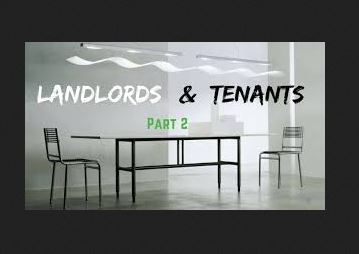A relationship between a Landlord and Tenant exist in contract by both parties. This contract is established by way of lease. A lease therefore, launches the relationship of landlord and tenants and his both a conveyance of a possessory estate in real property and a contract between the parties. Through the lease, the tenant receives a right to legal possession of the property in exchange for valuable consideration (the rent) paid to the landlord. It is pertinent to note that most leases specify the duration of the agreement, any terms for extending the agreement and details regarding rent payments. A lease create room for two sets of duties to arise between the landlord and tenant: these duties arises in relation to a residential property law, and in relation to contractual promises of the lease. By and large the contract between the landlord and tenant is ensured by warranty which is prescribed by common or statutory law. And any issue that might arise in the cause of dealings between the landlord and tenant may be regarded as a breach of warranty which may allow eviction by the landlord or allow the tenant to withhold rent. Nevertheless, what is the position of the tenant when property is sold?
The lease agreement between the landlord and tenant is a legally binding document and it stands regardless of whether or not the landlord decides to sell the property. Essentially, this means that purchasing the property inevitably makes whoever buys it the new landlord, whether they planned to be or not. That is, the purchaser of the property takes over the property including the assets, liabilities and tenants in it. This is because the tenancy agreement between the landlord and his tenant will be deemed to be subsisting and inherited by the new landlord.
This earned credence in the case of Chaka v. Messrs. Aerobell (Nig) Ltd. (2012) 12 NWLR pt. 1314 when Justice SAULAWA J.C.A said, “the covenants therein (in tenancy agreement) are binding not only on the landlord and tenant but also any person whom the property subsequently passes thereto. Undoubtedly, the terms ‘landlord and tenant’ as couched in the tenancy agreement in question include ‘the successors-in-title and assigns of both the tenants and landlord, respectively.”
The crux of the issue is that the lease is the umbilical cord that connects the landlord and tenant and until it is been severed (elapse, changed, rewritten) it remains binding on tenants and their landlord, his privy or new purchaser.
However, the exception to this rule is, if the lease agreement has special conditions regarding a property sale, that is, ‘in the event of sale, current lease agreement will be void once a new owner takes over the property.” Or, if you and your landlord mutually agree to end the lease agreement and you agreed to move out on a designated date.
This sums up the position of the tenant in the event of property been sold by the landlord. The tenants therefore have no reason to panic for house rent been inflated or kicked out the house by the new owner.
Source: Barrister Ng





